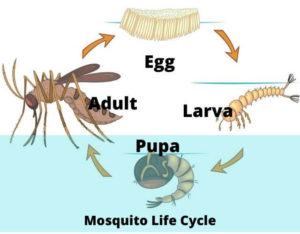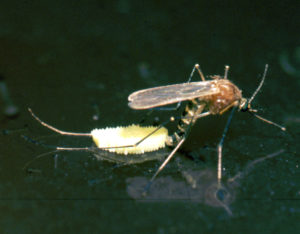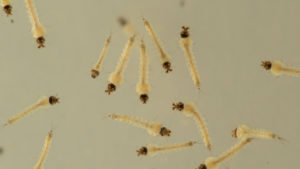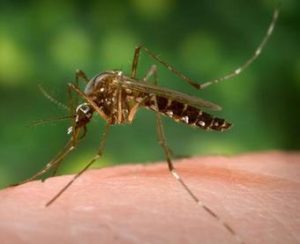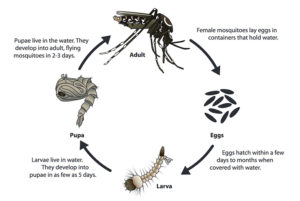READ ALL ABOUT IT
CHECK OUT OUR BLOG FOR CHICAGOLAND & SOUTHERN WISCONSIN
The Life Cycle of a Mosquito
The Life Cycle of a Mosquito
Mosquitoes generally stay on the water’s surface for a brief duration after emerging. This is primarily to facilitate their delicate wings’ drying process and allow their body to solidify and gain strength. Although the exact duration may vary, it can be inferred that mosquitoes spend only a relatively short amount of time on the water’s surface before venturing into their next stage of development or initiating flight.
Did you know that a female mosquito can lay up to 300 eggs at a time? Having a good understanding of a mosquito’s life cycle can help you to prevent and eliminate mosquito populations around your home before they can even become a problem. The length of a mosquito’s life depends on various things such as temperature and moisture conditions, however, every single mosquito passes through four specific life cycles. The more you know now, the better prepared you can be when spring brings a new crop of mosquitoes to your yard!
Eggs
Female mosquitoes lay hundreds of eggs multiple times a week throughout their lifespan directly on or near water. If they are laid near water, they can last in these dry conditions for months, and once they are flooded with water, they can hatch. Water is required for a mosquito egg to hatch. Mosquito eggs can endure without water for a significant period. Specifically, once these eggs are placed in a container, they can survive up to 8 months without any access to water.
Larvae
Once an egg hatches, the second stage begins as the larvae emerge. Larvae are often called “wigglers” because of how they appear when they swim. The length of time for an egg to hate depends on food, water temperature, and the type of mosquito it is. The larvae will live in water, molting multiple times as they feed and develop into the third stage of their life cycle, called the pupa.
Pupae

The larvae will continue to develop through the molting process, and as they progress, they move into the third life cycle stage, called the pupae stage. The pupae do not feed during this cycle but will continue to live in the water. In this stage, the mosquito is referred to as a “tumbler” for the way it falls into deeper parts of the water because it needs to avoid predators. It takes several days for the pupae to emerge into adult mosquitos; the exact number depends on species and water temperature.
Adult
Once fully developed, the mosquito will emerge from the water and begin flying shortly after they have dried out and its body parts have hardened. Male mosquitoes begin mating with females after their reproductive organs develop which only takes a day or two. Female mosquitoes mate only once, but they continue to lay eggs after every blood meal they enjoy until the day they die. Under ideal conditions, females can live for a month, feeding and laying eggs as long as possible. An adult mosquito has a head with two eyes, a thorax, a pair of wings with six jointed legs, and the proboscis, or straw-like tube that covers six thin needles that the mosquito uses to cut the skin and suck out blood.
In terms of lifespan, male mosquitoes have a shorter existence than their female counterparts. While the male mosquito’s lifespan is limited to approximately one week, the female mosquitoes have a significantly longer life expectancy of up to 100 days.
How to Guard Your Yard
Guarding your yard against mosquitoes is essential for a comfortable and enjoyable outdoor experience. Here are some practical tips to help you keep those pesky insects at bay:
1. Eliminate Standing Water:
Mosquitoes breed in stagnant water, so removing any potential breeding sites is crucial. Regularly empty or treat containers such as buckets, flower pots, and birdbaths. Ensure that gutters are clean and free of debris to prevent water accumulation.
2. Maintain Your Yard:
Mosquitoes seek shelter in tall grass and dense vegetation. Keep your lawn well-maintained by regularly mowing it and trimming overgrown bushes and plants. This eliminates potential resting places for mosquitoes.
3. Install Screens:
Keep the doors and windows of your home secured with tight-fitting screens. Ensure there are no tears or holes that mosquitoes can enter through. Additionally, consider installing screen doors or windows in outdoor spaces like patios or gazebos.
4. Use Mosquito Repellents:
Apply insect repellents on exposed skin and clothing when spending time outdoors. Look for products containing DEET, picaridin, or oil of lemon eucalyptus, as they are known to be effective against mosquitoes. Follow the instructions on the labels carefully.
5. Dress Appropriately:
Cover up to reduce mosquito exposure. Wear long sleeves, pants, and socks, especially during peak mosquito activity times, such as dawn and dusk. Light-colored clothing can also help deter mosquitoes.
6. Use Mosquito Traps or Bug Zappers:
Consider using mosquito traps or bug zappers to attract and capture mosquitoes. These devices use various methods, such as carbon dioxide or UV light, to lure the insects and then trap or eliminate them.
7. Employ Natural Remedies:
Certain plants, such as citronella, lavender, and marigolds, are known to repel mosquitoes. Planting these around your yard may help reduce mosquito populations. Additionally, burning citronella candles or using essential oils derived from these plants can provide some repellent properties.
8. Call Professional Pest Control:
If you have a persistent mosquito problem, it may be beneficial to seek help from a professional pest control service. They can assess your yard, identify potential breeding areas, and provide targeted treatments to eliminate mosquitoes from your property.
By implementing these strategies, you can effectively guard your yard against mosquitoes and create a more enjoyable outdoor environment for yourself and your family. Remember, mosquito control is an ongoing process, so consistency is key in maintaining a mosquito-free yard.

